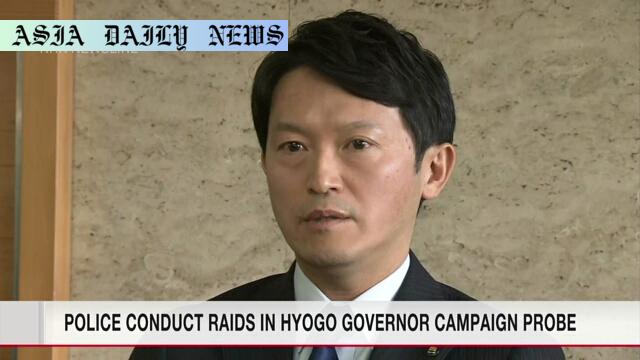Hyogo governor under scrutiny for alleged election law violations involving PR firm’s online campaign operations.
Hyogo Governor Saito Motohiko faces allegations of violating election laws.
Investigators are looking into charges of bribery for online campaign activities.
The PR firm’s payment has raised questions of illegality and ethics.
All confiscated documents are being analyzed for potential criminal charges.

Allegations Against Hyogo Governor
The political landscape in Hyogo Prefecture, western Japan, has been shaken by allegations against Governor Saito Motohiko. Reports indicate that Saito may have violated the public offices election law. The claim focuses on payments made to a PR company that might have been tied to strategic social media management during his reelection campaign last year.
Details of the Investigation
On Friday, prosecutors and police began conducting rigorous searches at multiple locations associated with Governor Saito’s campaign. The central question revolves around whether payments to the PR firm constituted illicit compensation for online election strategies, potentially qualifying under election bribery laws. Investigators seized various documents to probe the matter further and will carefully analyze the materials to determine if criminal charges should be filed.
Background of the Complaint
In December, the Kobe District Public Prosecutors Office and the Hyogo prefectural police received a formal complaint. This was filed by a lawyer and a university professor, alleging that Saito’s actions crossed legal boundaries. They pointed to a statement made by the PR firm’s representative, who stated that their team handled strategic planning for Saito’s social media activities during the campaign. If this compensation constitutes a reward for campaigning work, it may breach Japan’s strict election laws against bribery.
Saito’s Defense
Governor Saito has maintained his innocence, telling reporters that he first learned of the investigation through media reports. He assured the public and authorities that he would provide full cooperation during the inquiry. “I have not violated the election law,” Saito stated firmly, defending his campaign’s integrity and practices.
Legal and Ethical Implications
This incident brings attention to legal and ethical issues in campaigning, particularly in the digital age. It raises questions about transparency, the role of PR firms, and potential loopholes in existing election laws. If found guilty, such an incident could set a precedent, potentially resulting in stricter regulations for online campaigns in Japan.
What Comes Next?
Investigators are expected to examine the seized documents meticulously before reaching a decision on criminal charges. This may involve cross-referencing documents, interviewing involved parties, and potentially uncovering further evidence. Meanwhile, public interest in the case remains high, with many awaiting the results of the investigations that could determine the governor’s political future.
Conclusion
The allegations against Hyogo Governor Saito Motohiko serve as a cautionary tale about the evolving intersections of law, politics, and technology. As investigations proceed, the case could have wide-ranging ramifications for how future campaigns are conducted in Japan.



Commentary
Analyzing the Hyogo Governor Investigation
The recent allegations against Governor Saito Motohiko have gripped not only Hyogo Prefecture but also the wider Japanese political landscape. Election laws are vital to ensuring fair democratic processes, and any potential violation—particularly one involving financial transactions and online strategy—raises serious concerns about transparency and ethics.
Role of Digital Campaign Strategies
This case underscores the increasing prominence of digital strategies in political campaigns. While conventional campaigning methods were once the norm, the digital age has brought about new opportunities and challenges. The involvement of a PR firm in managing online operations, if true, might signify how campaigns are adapting, but it also raises questions about accountability and legal boundaries.
Implications Moving Forward
Should the allegations hold merit, this case could fundamentally shift the regulatory framework for election campaigns in Japan. Stricter oversight and clearer guidelines may be needed to curb any misuse of funds or exploitation of loopholes. Furthermore, this situation could serve as a warning signal for politicians and their associations, emphasizing the importance of adhering to established laws.
The Importance of Transparency
As the investigation unfolds, transparency remains crucial—not just for those under scrutiny but also for the authorities handling the case. Public trust in the political system hinges on handling such matters with integrity. Governor Saito’s pledge to cooperate fully with investigators should be welcomed, but only a clear and unbiased investigation can provide closure.
Overall, this event not only highlights the complexities of modern-day campaigning but also serves as an opportunity for Japan to refine its election-related practices in a rapidly digitalizing world.